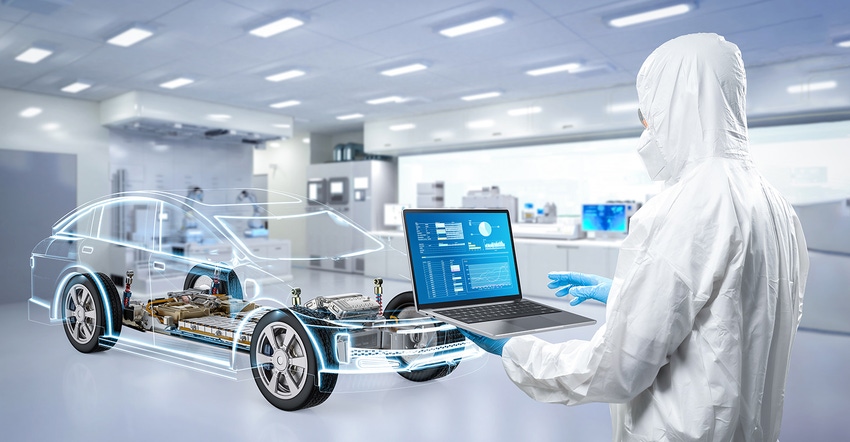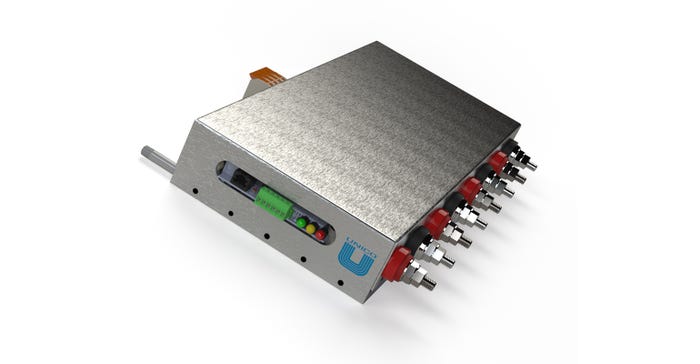EV Battery Testing: Ensuring Quality, Reliability, and Rapid Innovation
Discover the pivotal role of testing in lithium-ion battery production, guided by insights from Unico's VP of Engineering, Don Wright.

The production of lithium-ion batteries is a complex process that requires attention to detail at every stage to ensure the final product meets high performance, reliability, and safety standards. Therefore, testing plays a critical role in validating the quality of materials, components, and the final battery assembly. From raw materials inspection to end-of-line testing, various testing methods and protocols are employed to assess and guarantee the integrity and functionality of lithium-ion batteries.
Once the raw materials have been tested and approved, they are processed and assembled into battery components, including electrodes, separators, and electrolytes. Quality control testing is conducted throughout each component manufacturing stage to verify dimensional accuracy, chemical composition, and structural integrity. For example, electrode coatings are tested for uniformity and thickness to ensure optimal electrochemical performance, while separators are tested for porosity and mechanical strength to prevent short circuits within the battery cell.
As the battery components are assembled into cells, modules, and packs, comprehensive testing procedures are implemented to assess their electrical, thermal, and mechanical characteristics. Electrical testing involves measuring parameters such as voltage, capacity, impedance, and self-discharge rate to verify the battery's performance and energy storage capabilities. Thermal testing evaluates the battery's ability to dissipate heat and withstand temperature variations, which ensures safe operation and prevents thermal runaway events.
In addition to electrical and thermal testing, mechanical testing is essential for assessing lithium-ion batteries' structural integrity and durability. Mechanical stress tests, such as crush, puncture, and vibration testing, simulate real-world operating conditions and evaluate the battery's resistance to physical damage and mechanical abuse.
Once the batteries have passed all individual component and assembly tests, they undergo final end-of-line testing to validate their overall performance and functionality. End-of-line testing typically involves subjecting the batteries to simulated operating conditions, such as charge-discharge cycles, temperature cycling, and overcharge/over-discharge scenarios, to evaluate their long-term reliability and safety. Any deviations from expected performance or potential safety risks are thoroughly investigated, and defective batteries are rejected or reworked to meet quality standards.
EV Battery testing with Unico
Don Wright, VP of Engineering at Unico—a provider of innovative EV test solutions—emphasizes the crucial role of battery testing in the manufacturing process of electric vehicles (EVs). Wright explained that testing occurs at two main stages: firstly, ensuring the individual battery cells meet performance standards before assembly into packs, and secondly, confirming the functionality of the complete battery pack with auxiliary components before integration into the vehicle. This "End-of-Line" (EOL) testing is essential for quality assurance and mitigating potential issues arising from increased production speeds and cost reductions. Wright said, “We need to be able to test the functionality on a component and then system-level before integrating the battery into the car during manufacturing.”
Battery testing contributes to quality
He highlighted the significant contribution of testing to maintaining quality standards throughout production by benchmarking initial cell manufacturing processes and continuously monitoring performance against established benchmarks. Advanced testing methods and pilot lines are employed to simulate real-world conditions and predict long-term reliability, essential for ensuring the battery lifespan required for EV applications.
“Testing is done on special pilot lines to ensure that the process for making the actual cells still gives a product that will meet the performance, life, and cost targets needed for the EV application. Unfortunately, this takes a long time. How do you ensure that a cell will last ten years in a car…without testing it for ten years? You have to use advanced testing methods, and many, many cells need to be tested simultaneously.” He continued.
“How do you ensure that a cell will last ten years in a car without testing it for ten years? You have to use advanced testing methods and many, many cells.”—Unico Engineering VP Don Wright
Tailoring EV battery testing
Wright also talked about how battery testing can be tailored to meet the specific needs of different EV manufacturers, accommodating shifts towards higher voltage packs and cost optimization. According to Wright, Unico's high-performance battery testers address these evolving requirements while providing energy-efficient solutions for comprehensive lab setups.
“Right now, I would say the biggest difference is the shift to higher-voltage battery packs and the attempt to reduce the cost of the battery with manufacturing optimization. Having an 800VDC battery can significantly help with weight, performance, and fast charging. This is why our 1200VDC high-performance battery tester is so popular right now.” Wright emphasized.

Unico's all-in-one solution (480VAC to DC) for cell formation and test channels for EV testing minimizes energy consumption while maximizing testing efficiency. Courtesy of Unico.
As battery technologies advance, testing methodologies must adapt to accommodate new chemistries like solid-state batteries. This necessitates increased testing capabilities, including high-performance and standard testing, to analyze performance and age cells effectively. Unico provides research-level and industrial-grade testers to meet diverse customer needs.
The future of battery testing
Integrating artificial intelligence (AI) and machine learning into battery testing processes holds promise for enhancing efficiency and predictive capabilities. AI can analyze data comprehensively, identifying patterns and anomalies that human analysis might overlook. This improves testing efficiency and enables predictive maintenance, enhancing safety and reliability.
“We will for sure see AI and machine learning being used to analyze data in ways that weren’t possible before. I think it can help us find things that we didn’t even know what or how to look for."—Unico Engineering VP Don Wright
“We will for sure see AI and machine learning being used to analyze data in ways that weren’t possible before. I think it can help us find things that we didn’t even know what or how to look for. We often collect data and then look specifically for certain things…for example…a rise in internal resistance, or different voltage drop for a certain test. But AI can look at the data as a whole and perhaps find things we wouldn’t even have thought to examine and then point those things out to us.” Wright concluded.
Battery testing plays a vital role in every stage of the production process of lithium-ion batteries, from raw materials inspection to end-of-line testing and beyond. By ensuring the quality, reliability, and safety of lithium-ion batteries, rigorous testing protocols contribute to the advancement of battery technology and the widespread adoption of clean energy solutions in various applications, including more than just electric vehicles but renewable energy storage, consumer electronics, and grid-scale energy storage systems.
About the Author(s)
You May Also Like





